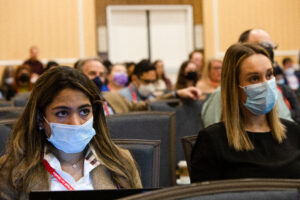
Dr. Anthony Fauci, head of the National Institute of Allergy and Infectious Diseases, has said the U.S. should have a national mask mandate. President-elect Joe Biden is in talks with governors to try to implement one when he takes office in January.
Mask wearing, however, remains a political hot-button. President Trump and many other Republicans have called mandates an overreach of the government and encroachment on freedom. Biden will have lots of work to depoliticize mask-wearing, NPR reports.
So, what is the latest on the science of masks?
Because COVID-19, the disease caused by the virus SARS-CoV-2, is transmitted through respiratory droplets that spread through the air, N95 masks, which effectively filter out large and small airborne particles that might be carrying the virus, are critical for health care providers treating COVID-19 patients. But surgical and cloth masks can’t filter out small particles in the air as effectively as N95 masks, so the question has been whether it made sense, as a public health policy, to ask the people to wear surgical and cloth masks.
Researchers have been working since the beginning of the pandemic to figure out how well non-N95 masks prevent transmission and how much they protect the wearer from inhaling respiratory droplets carrying the SARS-CoV-2 virus. As usual, the answer isn’t certain. Science is messy and takes time, which has enabled controversy to continue.
But a growing body of studies — almost all observational — shows that masks can reduce both the risk of transmission and infection from the virus. That is why the CDC, in mid-November, advised the public that using cloth masks can help control the spread of the virus and can protect people too.
“Masks are primarily intended to reduce the emission of virus-laden droplets,” the CDC report said. And they “also help reduce inhalation of these droplets by the wearer. The community benefit of masking for SARS-CoV-2 control is due to the combination of these effects.”
Still, controversy about mask-wearing and its effectiveness was in the spotlight again after a study published on Nov. 18 in the Annals of Internal Medicine concluded that surgical masks had a very small benefit to wearers in preventing infection.
The large, randomized study was conducted in Denmark in April and May 2020 when mask-wearing wasn’t required in the country. One group was given surgical masks to wear anytime they were in public, and another was not. Fewer people in the mask-wearing group (around 16% on average) became infected with the virus than those who didn’t wear masks, but the number was not statistically significant.
The study, the first large randomized study on mask-wearing, was seized on as proof that mask-wearing is ineffective. But the study’s lead author and public health officials countered that its conclusion misconstrued science, and even a small reduction in risk is meaningful when it comes to COVID-19.
Former CDC director Tom Frieden questioned the conclusion of the study in an editorial published with it, noting several limitations:
- COVID-19 community spread was low at the time of the study.
- The antibody testing used in the study may not have been accurate.
- Those who said they were wearing masks may not have done so correctly.
To be most effective, mask use must be used in conjunction with maintaining a physical distance of at least six feet, utilizing hand hygiene and, if inside, being in an environment with good ventilation.
“Wearing a mask is highly effective and can make your daily life safer for those around you, but it’s not a permission slip to ‘return to normal,’” according to a University of Maryland Medical System publication about myths and facts about mask-wearing.
The CDC says research continues on this issue, as does research on what types of cloth masks are most effective. On Nov. 20, Virginia Tech published a study showing what materials work best for homemade masks. Co-author Linsey Marr is a civil and environmental engineer professor and expert on how airborne pathogens interact in the air. Her Twitter feed is useful reading for reporters covering the mask debate.
CBC Marketplace published a Nov. 13 study, using the National Institute for Occupational Safety and Health standards, that found a three-layer cotton mask with a polypropylene filter to be among the most effective.
Further reading
- Elemental: The most likely way that you will get infected with the coronavirus, September 2020
- Virginia Tech: Study shows cloth coverings help protect wearers and those nearby, Nov. 23, 2020
- WebMD: How much does wearing a mask protect you? 20, 2020
- Washington Post: Health experts dispute conservatives’ claim that new study finds masks are ineffective, Nov. 20, 2020
- New York Times: The CDC updates its findings: mask-wearing protects you, not just those around you, Nov. 20, 2020
- CDC: Scientific Brief: Community use of cloth masks to control the spread of SARS-CoV-2, updated Nov. 20, 2020
- CBC Marketplace: Marketplace tested over 20 masks. Here’s what will best protect you and others during the pandemic, Nov. 13, 2020
- Nature: Modeling COVID-19 scenarios for the United States, Oct. 23, 2020
- Nature: Face masks: what the data say, Oct. 6, 2020
- Mayo Clinic: COVID-19: How much protection do face masks offer? August 2020
- University of Maryland Medical System: Wearing a mask: myths and facts







